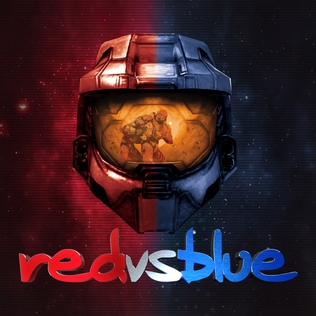
Machinima, originally machinema is the use of real-time computer graphics engines to create a cinematic production. Most often, video games are used to generate the computer animation.
Wendigo is a mythological creature or evil spirit which originates from the folklore of First Nations based in and around the East Coast forests of Canada, the Great Plains region of the United States, and the Great Lakes region of the United States and Canada, grouped in modern ethnology as speakers of Algonquian-family languages. The wendigo is often said to be a malevolent spirit, sometimes depicted as a creature with human-like characteristics, which possesses human beings. The wendigo is known to invoke feelings of insatiable greed/hunger, the desire to cannibalize other humans, as well as the propensity to commit murder in those that fall under its influence.

Red vs. Blue, often abbreviated as RvB, is an American comic science fiction web series created by Burnie Burns with his production company Rooster Teeth. The show is based on the setting of the military science fiction first-person shooter series and media franchise Halo. It is distributed through Rooster Teeth's website, as well as on DVD, Blu-ray, and formerly on the El Rey Network and Netflix. The series initially centers on two opposing teams of soldiers fighting an ostensible civil war—shown in increments to actually be a live fire exercise for elite soldiers—in the middle of Blood Gulch, a desolate box canyon, in a parody of first-person shooter video games, military life, and science fiction films. Initially intended to be a short series of six to eight episodes, the project quickly and unexpectedly achieved significant popularity following its premiere on April 1, 2003. The series consists of eighteen seasons and five mini-series. Red vs. Blue is the third longest-running animated webseries of all time, behind Homestar Runner and Neurotically Yours.
Katherine Anna Kang is an American businesswoman, video game designer and producer, machinima and documentary film maker.

Michael Justin "Burnie" Burns is an American writer, actor, producer, comedian, host, and director previously based in Austin, Texas. He is a co-founder, former chief executive officer, and former chief creative officer of Rooster Teeth. He is noted for his contributions in machinima, a form of film-making that uses video game technology in its production, and also works with animation and live action. Burns is also known for his work in the hosting and podcasting field.

The French Democracy is a short 2005 French political film made by Alex Chan using computer animation from Lionhead Studios' 2005 business simulation game The Movies. The plot centers on three Moroccan men who turn to rioting after facing different forms of discrimination. Chan, a French native of Chinese descent, created the film to convey his view that racism caused the riots of the 2005 civil unrest in France. Although Chan was restricted by shortcomings and technical limitations in The Movies, he finished the film after four days of production.

This Spartan Life is a talk show created by Bong + Dern Productions and produced and directed by Chris Burke, who hosts the show under the pseudonym Damian Lacedaemion. Premiering in 2005 and distributed over the Internet, the show is created using the machinima technique of recording the video and audio from a multiplayer Xbox Live session of Bungie' first-person shooter video game Halo 2. The half-hour episodes are released in six smaller parts, called modules. Guests, such as Bungie's audio director Martin O'Donnell are interviewed via Xbox Live within the online multiplayer worlds of Halo 2, and most recently Halo 3.

Diary of a Camper is a short American film made using id Software's 1996 first-person shooter video game Quake, released in 1996. It was created by United Ranger Films, then a subdivision of a popular group of video game players, or clan, known as the Rangers. The film was first released over the Internet as a non-interactive game demo file. The video is generally considered the first known example of machinima—the art of using real-time, virtual 3D environments, often game engines, to create animated films. The story centers on a lone camper, a player waiting in a strategic location instead of seeking active battle, who faces five members of the Rangers clan in a deathmatch, a type of multiplayer game in which the goal is to kill as many opponents as possible.
Quake done Quick is a series of collaborative speedruns and machinima movies in which the video game Quake, its mission packs, and related games are completed as quickly as possible without the use of cheats. Most playthroughs use shortcuts or tricks, such as bunny hopping and rocket jumping, in order to achieve a faster time. These movies are available in the game engine's native demo format and in various multimedia formats such as AVI.

Operation Bayshield is a short 1997 film made by Clan Undead, a group of video game players. The work was created by using the machinima technique of recording a demonstration file of player actions in id Software's 1996 first-person shooter video game Quake, which could replay such files on demand. The group had seen the first known machinima productions, made by United Ranger Films, and decided to make a comedy film. The result, Operation Bayshield, follows a task force's attempts to thwart terrorists who have chemical explosives. Released on January 23, 1997, the work received praise from contemporary Quake movie review sites and helped to attract others, including Hugh Hancock of Strange Company and members of the ILL Clan, to machinima. It pioneered technical advances in machinima, such as the use of custom digital assets and of lip synchronization.
The following is a list of notable machinima-related events in the year 1996. These include the release of id Software's first-person shooter computer game Quake. This game was used to create the first machinima works later that year.

The Seal of Nehahra is an American film made in 2000, created by Mindcrime Productions as part of the Nehahra Project. Made using a modified version of id Software's 1996 first-person shooter computer game Quake and released over the Internet as a non-interactive game demo package, the film was the longest released Quake movie — as Quake-based machinima was known at the time. At a total length of three hours and fifty five minutes, it is the longest single-piece machinima production as of 2017. The film received high reviews from the major Quake movie review sites of the time, Psyk's Popcorn Jungle and The Cineplex.

Wendigo is a 2001 American independent psychological horror film written and directed by Larry Fessenden, starring Patricia Clarkson and Jake Weber. The film follows a photographer, George, and his family who experience the presence of a dark force in a cabin during their wintry weekend at upstate New York while being antagonized by a local hunter after accidentally hitting a deer on the road. Meanwhile, George's son, Miles, begins to have vivid hallucinations of the legendary Wendigo, who he believes to be responsible for the dark forces

Machinima, Inc. was an American multiplatform online entertainment network owned by WarnerMedia. The company was founded in January 2000 by Hugh Hancock and was headquartered in Los Angeles, California.
DeFRaG is a free software modification for id Software's first-person shooter computer game Quake III Arena (Q3A). The mod is dedicated to player movements and trickjumping. It aims at providing a platform for self-training, competition, online tricking, machinima making, and trickjumping. Hence it constitutes an exception among other Q3A mods.

Dance, Voldo, Dance is a machinima-based music video produced in 2002 by Chris Brandt. The video, created using the fighting game Soulcalibur, features two players both controlling the character Voldo, using existing in-game animation to have the characters perform a synchronized dance to the song "Hot in Herre" by musician Nelly. The result of over a week's full-time preparation and training, the video was conceived after Brandt noticed the character's animations and attacks could be triggered in sync with the beat of a song, and the reactions of onlookers to such a display. While several groups demonstrated interest in showcasing the video, complications arose from the copyright holders whose works were involved in creation.

Male Restroom Etiquette is a 2006 American short subject created by Phil R. Rice and produced by his company Zarathustra Studios. The film is a mockumentary about unwritten rules of behavior in male restrooms and is intended to be a parody of educational and social guidance films. Narrated by Rice, Male Restroom Etiquette states restroom customs to be followed and depicts a scenario of social chaos if they are violated. The film was made using the machinima technique of recording video footage from computer games, namely The Sims 2 and SimCity 4. Male Restroom Etiquette won multiple awards and was listed by Guinness World Records Gamer's Edition in 2009 as the most popular Sims video uploaded to YouTube.
Deviation is a 2006 short film that was the first short film in the machinima genre to be premiered in competition at a major film festival, the Tribeca Film Festival.
Based on Id Software's open stance towards game modifications, their Quake series became a popular subject for player mods beginning with Quake in 1996. Spurred by user-created hacked content on their previous games and the company's desire to encourage the hacker ethic, Id included dedicated modification tools into Quake, including the QuakeC programming language and a level editor. As a game that popularized online first-person shooter multiplayer, early games were team- and strategy-based and led to prominent mods like Team Fortress, whose developers were later hired by Valve to create a dedicated version for the company. Id's openness and modding tools led to a "Quake movie" community, which altered gameplay data to add camera angles in post-production, a practice that became known as machinima.












